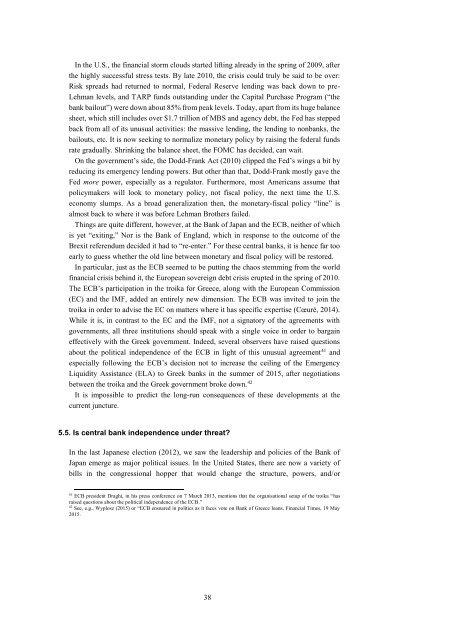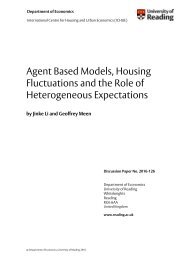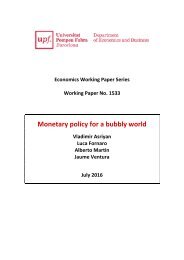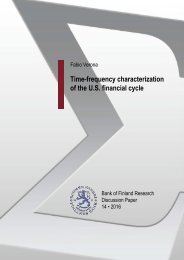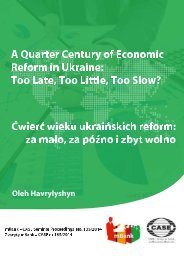Necessity as the mother of invention monetary policy after the crisis
n?u=RePEc:dnb:dnbwpp:525&r=mac
n?u=RePEc:dnb:dnbwpp:525&r=mac
Create successful ePaper yourself
Turn your PDF publications into a flip-book with our unique Google optimized e-Paper software.
In <strong>the</strong> U.S., <strong>the</strong> financial storm clouds started lifting already in <strong>the</strong> spring <strong>of</strong> 2009, <strong>after</strong><br />
<strong>the</strong> highly successful stress tests. By late 2010, <strong>the</strong> <strong>crisis</strong> could truly be said to be over:<br />
Risk spreads had returned to normal, Federal Reserve lending w<strong>as</strong> back down to pre-<br />
Lehman levels, and TARP funds outstanding under <strong>the</strong> Capital Purch<strong>as</strong>e Program (“<strong>the</strong><br />
bank bailout”) were down about 85% from peak levels. Today, apart from its huge balance<br />
sheet, which still includes over $1.7 trillion <strong>of</strong> MBS and agency debt, <strong>the</strong> Fed h<strong>as</strong> stepped<br />
back from all <strong>of</strong> its unusual activities: <strong>the</strong> m<strong>as</strong>sive lending, <strong>the</strong> lending to nonbanks, <strong>the</strong><br />
bailouts, etc. It is now seeking to normalize <strong>monetary</strong> <strong>policy</strong> by raising <strong>the</strong> federal funds<br />
rate gradually. Shrinking <strong>the</strong> balance sheet, <strong>the</strong> FOMC h<strong>as</strong> decided, can wait.<br />
On <strong>the</strong> government’s side, <strong>the</strong> Dodd-Frank Act (2010) clipped <strong>the</strong> Fed’s wings a bit by<br />
reducing its emergency lending powers. But o<strong>the</strong>r than that, Dodd-Frank mostly gave <strong>the</strong><br />
Fed more power, especially <strong>as</strong> a regulator. Fur<strong>the</strong>rmore, most Americans <strong>as</strong>sume that<br />
<strong>policy</strong>makers will look to <strong>monetary</strong> <strong>policy</strong>, not fiscal <strong>policy</strong>, <strong>the</strong> next time <strong>the</strong> U.S.<br />
economy slumps. As a broad generalization <strong>the</strong>n, <strong>the</strong> <strong>monetary</strong>-fiscal <strong>policy</strong> “line” is<br />
almost back to where it w<strong>as</strong> before Lehman Bro<strong>the</strong>rs failed.<br />
Things are quite different, however, at <strong>the</strong> Bank <strong>of</strong> Japan and <strong>the</strong> ECB, nei<strong>the</strong>r <strong>of</strong> which<br />
is yet “exiting,” Nor is <strong>the</strong> Bank <strong>of</strong> England, which in response to <strong>the</strong> outcome <strong>of</strong> <strong>the</strong><br />
Brexit referendum decided it had to “re-enter.” For <strong>the</strong>se central banks, it is hence far too<br />
early to guess whe<strong>the</strong>r <strong>the</strong> old line between <strong>monetary</strong> and fiscal <strong>policy</strong> will be restored.<br />
In particular, just <strong>as</strong> <strong>the</strong> ECB seemed to be putting <strong>the</strong> chaos stemming from <strong>the</strong> world<br />
financial <strong>crisis</strong> behind it, <strong>the</strong> European sovereign debt <strong>crisis</strong> erupted in <strong>the</strong> spring <strong>of</strong> 2010.<br />
The ECB’s participation in <strong>the</strong> troika for Greece, along with <strong>the</strong> European Commission<br />
(EC) and <strong>the</strong> IMF, added an entirely new dimension. The ECB w<strong>as</strong> invited to join <strong>the</strong><br />
troika in order to advise <strong>the</strong> EC on matters where it h<strong>as</strong> specific expertise (Cœuré, 2014).<br />
While it is, in contr<strong>as</strong>t to <strong>the</strong> EC and <strong>the</strong> IMF, not a signatory <strong>of</strong> <strong>the</strong> agreements with<br />
governments, all three institutions should speak with a single voice in order to bargain<br />
effectively with <strong>the</strong> Greek government. Indeed, several observers have raised questions<br />
about <strong>the</strong> political independence <strong>of</strong> <strong>the</strong> ECB in light <strong>of</strong> this unusual agreement 41 and<br />
especially following <strong>the</strong> ECB’s decision not to incre<strong>as</strong>e <strong>the</strong> ceiling <strong>of</strong> <strong>the</strong> Emergency<br />
Liquidity Assistance (ELA) to Greek banks in <strong>the</strong> summer <strong>of</strong> 2015, <strong>after</strong> negotiations<br />
between <strong>the</strong> troika and <strong>the</strong> Greek government broke down. 42<br />
It is impossible to predict <strong>the</strong> long-run consequences <strong>of</strong> <strong>the</strong>se developments at <strong>the</strong><br />
current juncture.<br />
5.5. Is central bank independence under threat?<br />
In <strong>the</strong> l<strong>as</strong>t Japanese election (2012), we saw <strong>the</strong> leadership and policies <strong>of</strong> <strong>the</strong> Bank <strong>of</strong><br />
Japan emerge <strong>as</strong> major political issues. In <strong>the</strong> United States, <strong>the</strong>re are now a variety <strong>of</strong><br />
bills in <strong>the</strong> congressional hopper that would change <strong>the</strong> structure, powers, and/or<br />
41<br />
ECB president Draghi, in his press conference on 7 March 2013, mentions that <strong>the</strong> organisational setup <strong>of</strong> <strong>the</strong> troika “h<strong>as</strong><br />
raised questions about <strong>the</strong> political independence <strong>of</strong> <strong>the</strong> ECB.”<br />
42<br />
See, e.g., Wyplosz (2015) or “ECB ensnared in politics <strong>as</strong> it faces vote on Bank <strong>of</strong> Greece loans, Financial Times, 19 May<br />
2015.<br />
38


